The Dynamics of Influence and Selection in Online and Offline Networks
VerifiedAdded on 2020/06/06
|13
|4776
|63
Essay
AI Summary
This essay delves into the core concepts of influence and selection within the realm of political sociology, examining their interplay and impact on individual and collective behaviors. It explores how both online and offline social networks act as platforms that facilitate communication, information dissemination, and the formation of relationships, which in turn, influence political attitudes, decision-making processes, and ultimately, the selection of political preferences. The essay draws on various academic viewpoints and empirical evidence to analyze the dynamics of weak and strong ties, echo chambers, and the impact of social media on political discourse and behavior, including the influence of relationships on the selection of political views, and provides insights into the ways in which these factors shape political outcomes.
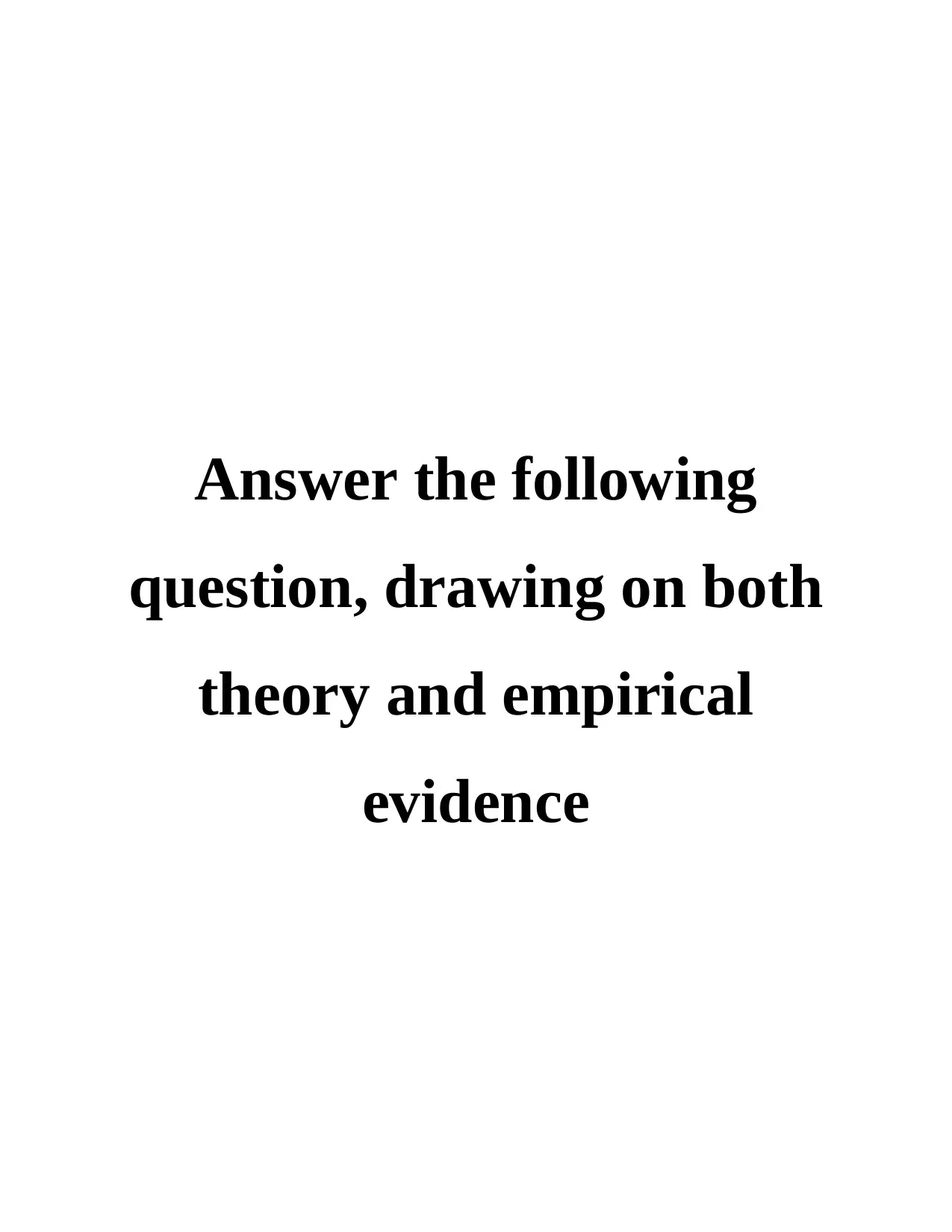
Answer the following
question, drawing on both
theory and empirical
evidence
question, drawing on both
theory and empirical
evidence
Paraphrase This Document
Need a fresh take? Get an instant paraphrase of this document with our AI Paraphraser
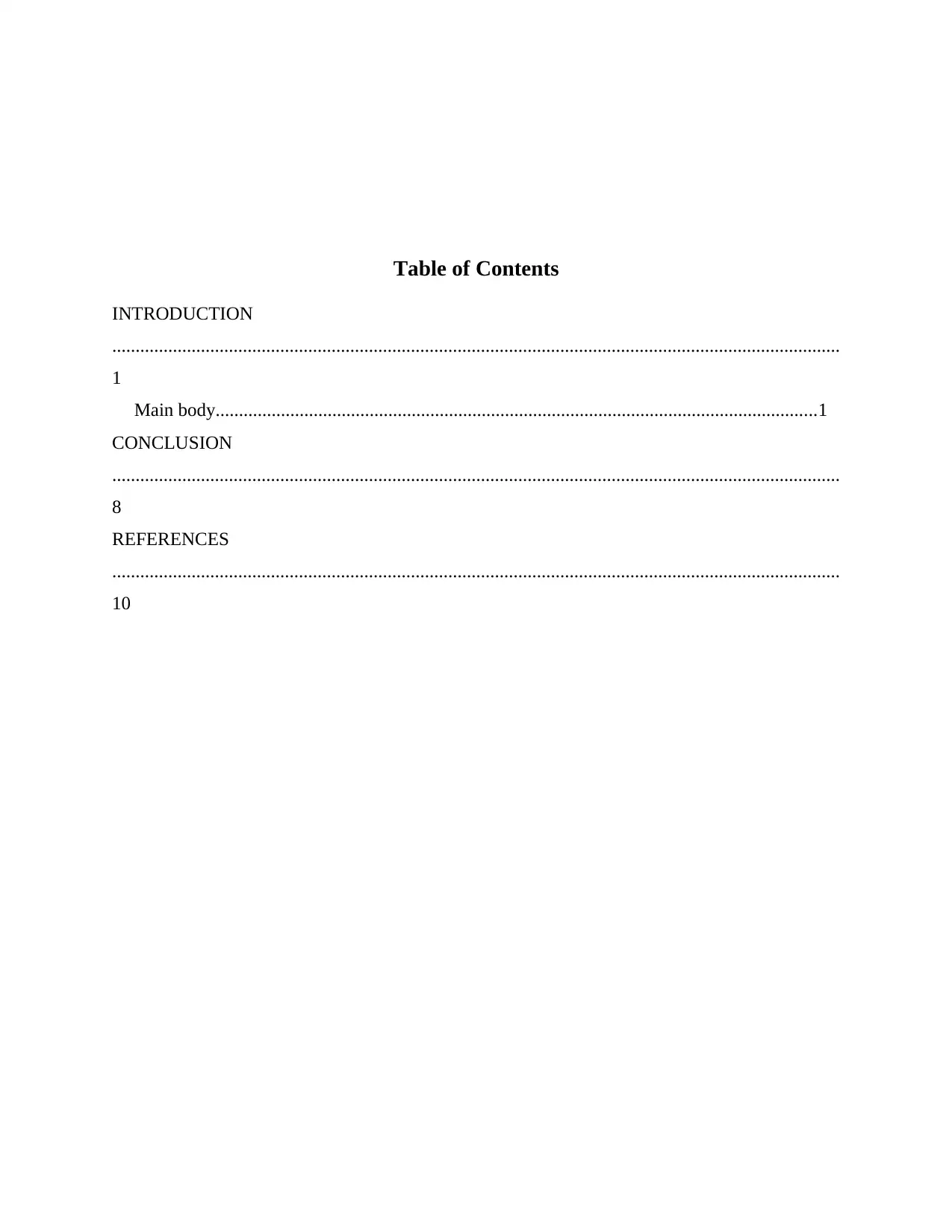
Table of Contents
INTRODUCTION
............................................................................................................................................................
1
Main body.................................................................................................................................1
CONCLUSION
............................................................................................................................................................
8
REFERENCES
............................................................................................................................................................
10
INTRODUCTION
............................................................................................................................................................
1
Main body.................................................................................................................................1
CONCLUSION
............................................................................................................................................................
8
REFERENCES
............................................................................................................................................................
10
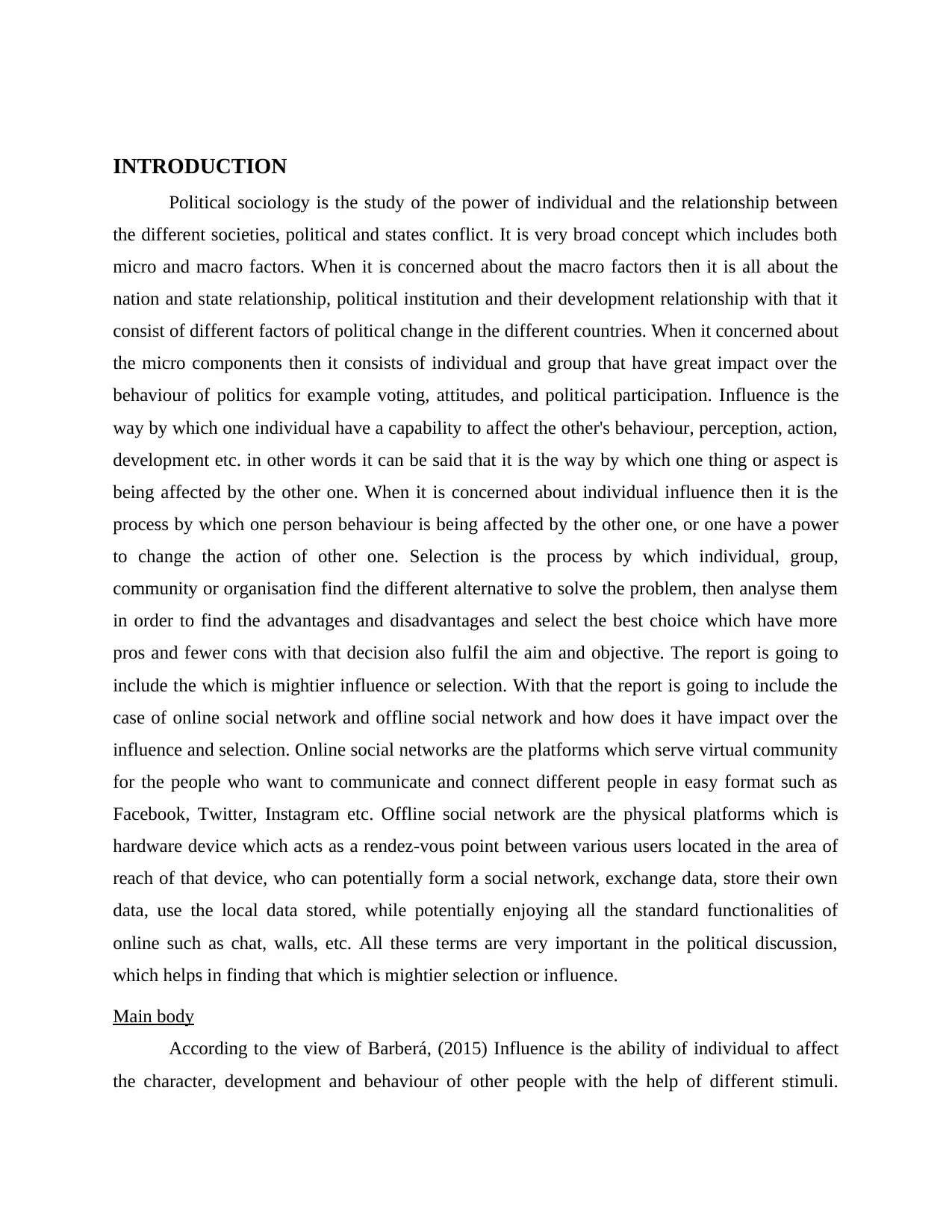
INTRODUCTION
Political sociology is the study of the power of individual and the relationship between
the different societies, political and states conflict. It is very broad concept which includes both
micro and macro factors. When it is concerned about the macro factors then it is all about the
nation and state relationship, political institution and their development relationship with that it
consist of different factors of political change in the different countries. When it concerned about
the micro components then it consists of individual and group that have great impact over the
behaviour of politics for example voting, attitudes, and political participation. Influence is the
way by which one individual have a capability to affect the other's behaviour, perception, action,
development etc. in other words it can be said that it is the way by which one thing or aspect is
being affected by the other one. When it is concerned about individual influence then it is the
process by which one person behaviour is being affected by the other one, or one have a power
to change the action of other one. Selection is the process by which individual, group,
community or organisation find the different alternative to solve the problem, then analyse them
in order to find the advantages and disadvantages and select the best choice which have more
pros and fewer cons with that decision also fulfil the aim and objective. The report is going to
include the which is mightier influence or selection. With that the report is going to include the
case of online social network and offline social network and how does it have impact over the
influence and selection. Online social networks are the platforms which serve virtual community
for the people who want to communicate and connect different people in easy format such as
Facebook, Twitter, Instagram etc. Offline social network are the physical platforms which is
hardware device which acts as a rendez-vous point between various users located in the area of
reach of that device, who can potentially form a social network, exchange data, store their own
data, use the local data stored, while potentially enjoying all the standard functionalities of
online such as chat, walls, etc. All these terms are very important in the political discussion,
which helps in finding that which is mightier selection or influence.
Main body
According to the view of Barberá, (2015) Influence is the ability of individual to affect
the character, development and behaviour of other people with the help of different stimuli.
Political sociology is the study of the power of individual and the relationship between
the different societies, political and states conflict. It is very broad concept which includes both
micro and macro factors. When it is concerned about the macro factors then it is all about the
nation and state relationship, political institution and their development relationship with that it
consist of different factors of political change in the different countries. When it concerned about
the micro components then it consists of individual and group that have great impact over the
behaviour of politics for example voting, attitudes, and political participation. Influence is the
way by which one individual have a capability to affect the other's behaviour, perception, action,
development etc. in other words it can be said that it is the way by which one thing or aspect is
being affected by the other one. When it is concerned about individual influence then it is the
process by which one person behaviour is being affected by the other one, or one have a power
to change the action of other one. Selection is the process by which individual, group,
community or organisation find the different alternative to solve the problem, then analyse them
in order to find the advantages and disadvantages and select the best choice which have more
pros and fewer cons with that decision also fulfil the aim and objective. The report is going to
include the which is mightier influence or selection. With that the report is going to include the
case of online social network and offline social network and how does it have impact over the
influence and selection. Online social networks are the platforms which serve virtual community
for the people who want to communicate and connect different people in easy format such as
Facebook, Twitter, Instagram etc. Offline social network are the physical platforms which is
hardware device which acts as a rendez-vous point between various users located in the area of
reach of that device, who can potentially form a social network, exchange data, store their own
data, use the local data stored, while potentially enjoying all the standard functionalities of
online such as chat, walls, etc. All these terms are very important in the political discussion,
which helps in finding that which is mightier selection or influence.
Main body
According to the view of Barberá, (2015) Influence is the ability of individual to affect
the character, development and behaviour of other people with the help of different stimuli.
⊘ This is a preview!⊘
Do you want full access?
Subscribe today to unlock all pages.

Trusted by 1+ million students worldwide
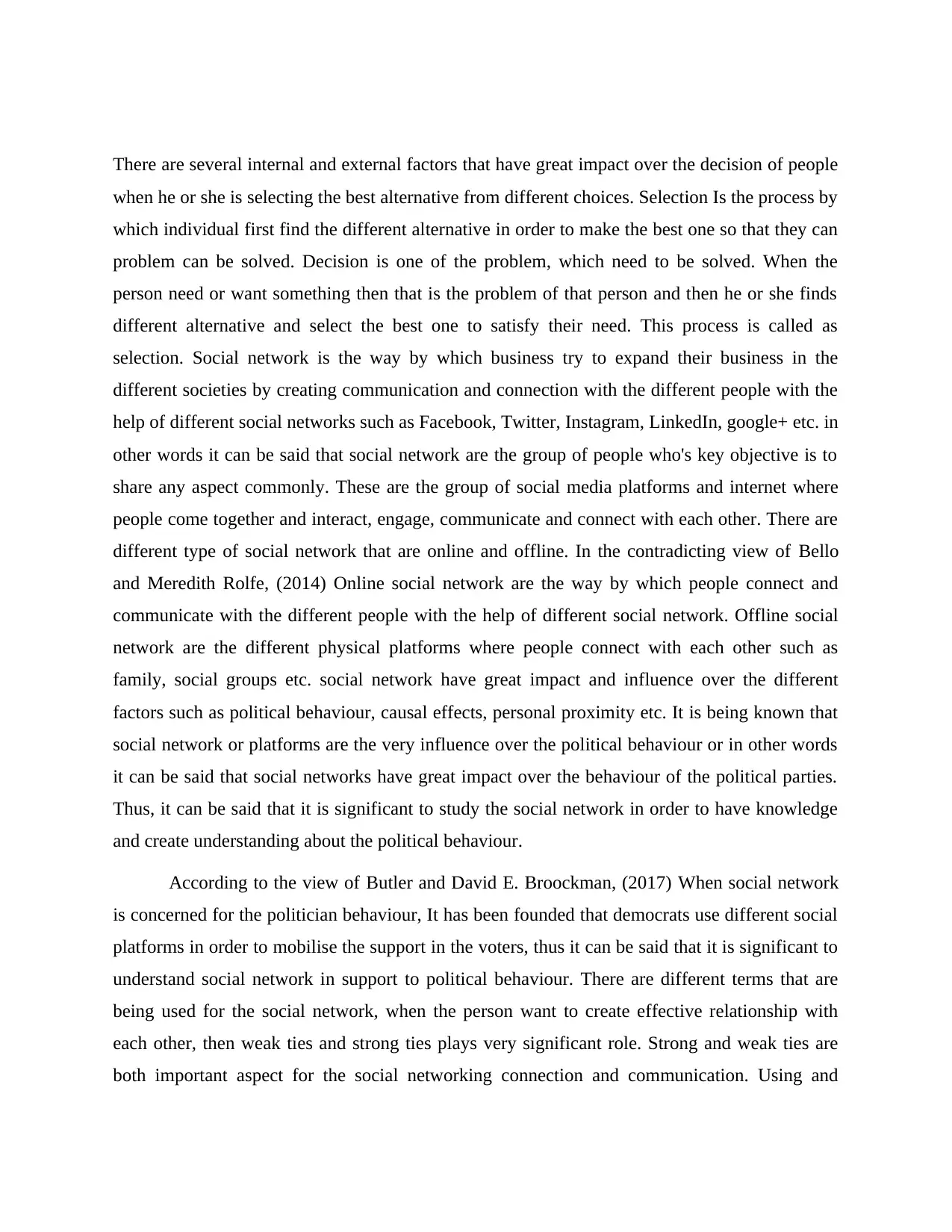
There are several internal and external factors that have great impact over the decision of people
when he or she is selecting the best alternative from different choices. Selection Is the process by
which individual first find the different alternative in order to make the best one so that they can
problem can be solved. Decision is one of the problem, which need to be solved. When the
person need or want something then that is the problem of that person and then he or she finds
different alternative and select the best one to satisfy their need. This process is called as
selection. Social network is the way by which business try to expand their business in the
different societies by creating communication and connection with the different people with the
help of different social networks such as Facebook, Twitter, Instagram, LinkedIn, google+ etc. in
other words it can be said that social network are the group of people who's key objective is to
share any aspect commonly. These are the group of social media platforms and internet where
people come together and interact, engage, communicate and connect with each other. There are
different type of social network that are online and offline. In the contradicting view of Bello
and Meredith Rolfe, (2014) Online social network are the way by which people connect and
communicate with the different people with the help of different social network. Offline social
network are the different physical platforms where people connect with each other such as
family, social groups etc. social network have great impact and influence over the different
factors such as political behaviour, causal effects, personal proximity etc. It is being known that
social network or platforms are the very influence over the political behaviour or in other words
it can be said that social networks have great impact over the behaviour of the political parties.
Thus, it can be said that it is significant to study the social network in order to have knowledge
and create understanding about the political behaviour.
According to the view of Butler and David E. Broockman, (2017) When social network
is concerned for the politician behaviour, It has been founded that democrats use different social
platforms in order to mobilise the support in the voters, thus it can be said that it is significant to
understand social network in support to political behaviour. There are different terms that are
being used for the social network, when the person want to create effective relationship with
each other, then weak ties and strong ties plays very significant role. Strong and weak ties are
both important aspect for the social networking connection and communication. Using and
when he or she is selecting the best alternative from different choices. Selection Is the process by
which individual first find the different alternative in order to make the best one so that they can
problem can be solved. Decision is one of the problem, which need to be solved. When the
person need or want something then that is the problem of that person and then he or she finds
different alternative and select the best one to satisfy their need. This process is called as
selection. Social network is the way by which business try to expand their business in the
different societies by creating communication and connection with the different people with the
help of different social networks such as Facebook, Twitter, Instagram, LinkedIn, google+ etc. in
other words it can be said that social network are the group of people who's key objective is to
share any aspect commonly. These are the group of social media platforms and internet where
people come together and interact, engage, communicate and connect with each other. There are
different type of social network that are online and offline. In the contradicting view of Bello
and Meredith Rolfe, (2014) Online social network are the way by which people connect and
communicate with the different people with the help of different social network. Offline social
network are the different physical platforms where people connect with each other such as
family, social groups etc. social network have great impact and influence over the different
factors such as political behaviour, causal effects, personal proximity etc. It is being known that
social network or platforms are the very influence over the political behaviour or in other words
it can be said that social networks have great impact over the behaviour of the political parties.
Thus, it can be said that it is significant to study the social network in order to have knowledge
and create understanding about the political behaviour.
According to the view of Butler and David E. Broockman, (2017) When social network
is concerned for the politician behaviour, It has been founded that democrats use different social
platforms in order to mobilise the support in the voters, thus it can be said that it is significant to
understand social network in support to political behaviour. There are different terms that are
being used for the social network, when the person want to create effective relationship with
each other, then weak ties and strong ties plays very significant role. Strong and weak ties are
both important aspect for the social networking connection and communication. Using and
Paraphrase This Document
Need a fresh take? Get an instant paraphrase of this document with our AI Paraphraser
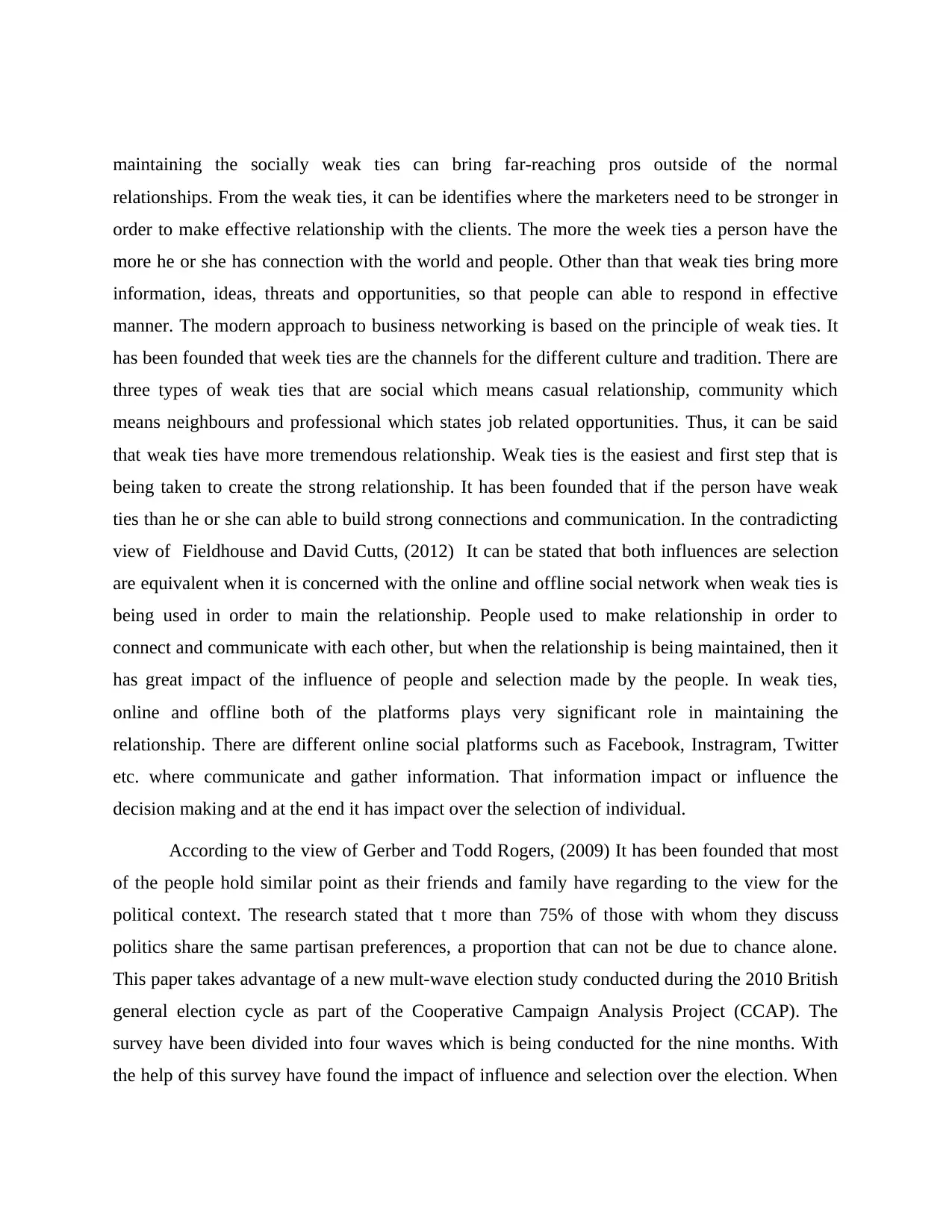
maintaining the socially weak ties can bring far-reaching pros outside of the normal
relationships. From the weak ties, it can be identifies where the marketers need to be stronger in
order to make effective relationship with the clients. The more the week ties a person have the
more he or she has connection with the world and people. Other than that weak ties bring more
information, ideas, threats and opportunities, so that people can able to respond in effective
manner. The modern approach to business networking is based on the principle of weak ties. It
has been founded that week ties are the channels for the different culture and tradition. There are
three types of weak ties that are social which means casual relationship, community which
means neighbours and professional which states job related opportunities. Thus, it can be said
that weak ties have more tremendous relationship. Weak ties is the easiest and first step that is
being taken to create the strong relationship. It has been founded that if the person have weak
ties than he or she can able to build strong connections and communication. In the contradicting
view of Fieldhouse and David Cutts, (2012) It can be stated that both influences are selection
are equivalent when it is concerned with the online and offline social network when weak ties is
being used in order to main the relationship. People used to make relationship in order to
connect and communicate with each other, but when the relationship is being maintained, then it
has great impact of the influence of people and selection made by the people. In weak ties,
online and offline both of the platforms plays very significant role in maintaining the
relationship. There are different online social platforms such as Facebook, Instragram, Twitter
etc. where communicate and gather information. That information impact or influence the
decision making and at the end it has impact over the selection of individual.
According to the view of Gerber and Todd Rogers, (2009) It has been founded that most
of the people hold similar point as their friends and family have regarding to the view for the
political context. The research stated that t more than 75% of those with whom they discuss
politics share the same partisan preferences, a proportion that can not be due to chance alone.
This paper takes advantage of a new mult-wave election study conducted during the 2010 British
general election cycle as part of the Cooperative Campaign Analysis Project (CCAP). The
survey have been divided into four waves which is being conducted for the nine months. With
the help of this survey have found the impact of influence and selection over the election. When
relationships. From the weak ties, it can be identifies where the marketers need to be stronger in
order to make effective relationship with the clients. The more the week ties a person have the
more he or she has connection with the world and people. Other than that weak ties bring more
information, ideas, threats and opportunities, so that people can able to respond in effective
manner. The modern approach to business networking is based on the principle of weak ties. It
has been founded that week ties are the channels for the different culture and tradition. There are
three types of weak ties that are social which means casual relationship, community which
means neighbours and professional which states job related opportunities. Thus, it can be said
that weak ties have more tremendous relationship. Weak ties is the easiest and first step that is
being taken to create the strong relationship. It has been founded that if the person have weak
ties than he or she can able to build strong connections and communication. In the contradicting
view of Fieldhouse and David Cutts, (2012) It can be stated that both influences are selection
are equivalent when it is concerned with the online and offline social network when weak ties is
being used in order to main the relationship. People used to make relationship in order to
connect and communicate with each other, but when the relationship is being maintained, then it
has great impact of the influence of people and selection made by the people. In weak ties,
online and offline both of the platforms plays very significant role in maintaining the
relationship. There are different online social platforms such as Facebook, Instragram, Twitter
etc. where communicate and gather information. That information impact or influence the
decision making and at the end it has impact over the selection of individual.
According to the view of Gerber and Todd Rogers, (2009) It has been founded that most
of the people hold similar point as their friends and family have regarding to the view for the
political context. The research stated that t more than 75% of those with whom they discuss
politics share the same partisan preferences, a proportion that can not be due to chance alone.
This paper takes advantage of a new mult-wave election study conducted during the 2010 British
general election cycle as part of the Cooperative Campaign Analysis Project (CCAP). The
survey have been divided into four waves which is being conducted for the nine months. With
the help of this survey have found the impact of influence and selection over the election. When
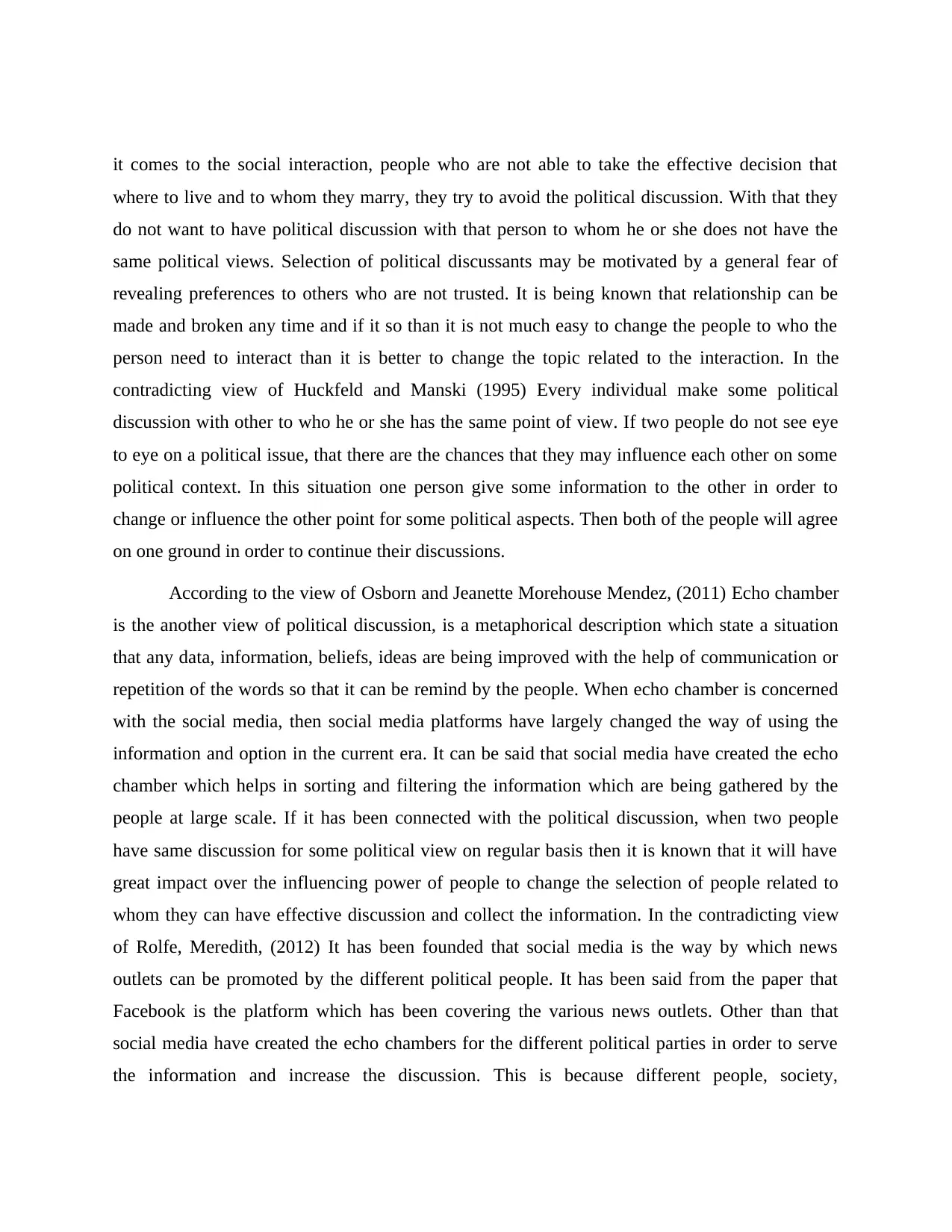
it comes to the social interaction, people who are not able to take the effective decision that
where to live and to whom they marry, they try to avoid the political discussion. With that they
do not want to have political discussion with that person to whom he or she does not have the
same political views. Selection of political discussants may be motivated by a general fear of
revealing preferences to others who are not trusted. It is being known that relationship can be
made and broken any time and if it so than it is not much easy to change the people to who the
person need to interact than it is better to change the topic related to the interaction. In the
contradicting view of Huckfeld and Manski (1995) Every individual make some political
discussion with other to who he or she has the same point of view. If two people do not see eye
to eye on a political issue, that there are the chances that they may influence each other on some
political context. In this situation one person give some information to the other in order to
change or influence the other point for some political aspects. Then both of the people will agree
on one ground in order to continue their discussions.
According to the view of Osborn and Jeanette Morehouse Mendez, (2011) Echo chamber
is the another view of political discussion, is a metaphorical description which state a situation
that any data, information, beliefs, ideas are being improved with the help of communication or
repetition of the words so that it can be remind by the people. When echo chamber is concerned
with the social media, then social media platforms have largely changed the way of using the
information and option in the current era. It can be said that social media have created the echo
chamber which helps in sorting and filtering the information which are being gathered by the
people at large scale. If it has been connected with the political discussion, when two people
have same discussion for some political view on regular basis then it is known that it will have
great impact over the influencing power of people to change the selection of people related to
whom they can have effective discussion and collect the information. In the contradicting view
of Rolfe, Meredith, (2012) It has been founded that social media is the way by which news
outlets can be promoted by the different political people. It has been said from the paper that
Facebook is the platform which has been covering the various news outlets. Other than that
social media have created the echo chambers for the different political parties in order to serve
the information and increase the discussion. This is because different people, society,
where to live and to whom they marry, they try to avoid the political discussion. With that they
do not want to have political discussion with that person to whom he or she does not have the
same political views. Selection of political discussants may be motivated by a general fear of
revealing preferences to others who are not trusted. It is being known that relationship can be
made and broken any time and if it so than it is not much easy to change the people to who the
person need to interact than it is better to change the topic related to the interaction. In the
contradicting view of Huckfeld and Manski (1995) Every individual make some political
discussion with other to who he or she has the same point of view. If two people do not see eye
to eye on a political issue, that there are the chances that they may influence each other on some
political context. In this situation one person give some information to the other in order to
change or influence the other point for some political aspects. Then both of the people will agree
on one ground in order to continue their discussions.
According to the view of Osborn and Jeanette Morehouse Mendez, (2011) Echo chamber
is the another view of political discussion, is a metaphorical description which state a situation
that any data, information, beliefs, ideas are being improved with the help of communication or
repetition of the words so that it can be remind by the people. When echo chamber is concerned
with the social media, then social media platforms have largely changed the way of using the
information and option in the current era. It can be said that social media have created the echo
chamber which helps in sorting and filtering the information which are being gathered by the
people at large scale. If it has been connected with the political discussion, when two people
have same discussion for some political view on regular basis then it is known that it will have
great impact over the influencing power of people to change the selection of people related to
whom they can have effective discussion and collect the information. In the contradicting view
of Rolfe, Meredith, (2012) It has been founded that social media is the way by which news
outlets can be promoted by the different political people. It has been said from the paper that
Facebook is the platform which has been covering the various news outlets. Other than that
social media have created the echo chambers for the different political parties in order to serve
the information and increase the discussion. This is because different people, society,
⊘ This is a preview!⊘
Do you want full access?
Subscribe today to unlock all pages.

Trusted by 1+ million students worldwide
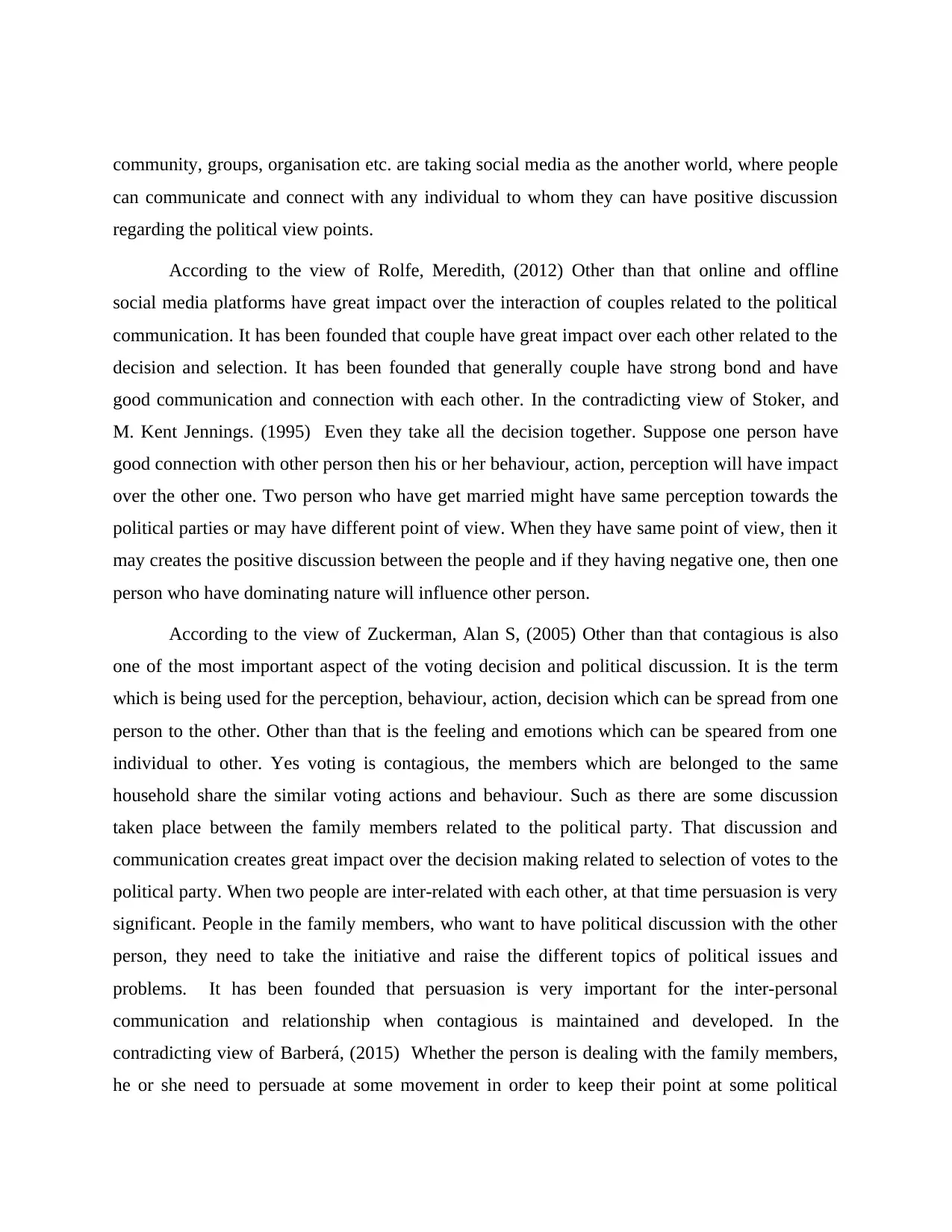
community, groups, organisation etc. are taking social media as the another world, where people
can communicate and connect with any individual to whom they can have positive discussion
regarding the political view points.
According to the view of Rolfe, Meredith, (2012) Other than that online and offline
social media platforms have great impact over the interaction of couples related to the political
communication. It has been founded that couple have great impact over each other related to the
decision and selection. It has been founded that generally couple have strong bond and have
good communication and connection with each other. In the contradicting view of Stoker, and
M. Kent Jennings. (1995) Even they take all the decision together. Suppose one person have
good connection with other person then his or her behaviour, action, perception will have impact
over the other one. Two person who have get married might have same perception towards the
political parties or may have different point of view. When they have same point of view, then it
may creates the positive discussion between the people and if they having negative one, then one
person who have dominating nature will influence other person.
According to the view of Zuckerman, Alan S, (2005) Other than that contagious is also
one of the most important aspect of the voting decision and political discussion. It is the term
which is being used for the perception, behaviour, action, decision which can be spread from one
person to the other. Other than that is the feeling and emotions which can be speared from one
individual to other. Yes voting is contagious, the members which are belonged to the same
household share the similar voting actions and behaviour. Such as there are some discussion
taken place between the family members related to the political party. That discussion and
communication creates great impact over the decision making related to selection of votes to the
political party. When two people are inter-related with each other, at that time persuasion is very
significant. People in the family members, who want to have political discussion with the other
person, they need to take the initiative and raise the different topics of political issues and
problems. It has been founded that persuasion is very important for the inter-personal
communication and relationship when contagious is maintained and developed. In the
contradicting view of Barberá, (2015) Whether the person is dealing with the family members,
he or she need to persuade at some movement in order to keep their point at some political
can communicate and connect with any individual to whom they can have positive discussion
regarding the political view points.
According to the view of Rolfe, Meredith, (2012) Other than that online and offline
social media platforms have great impact over the interaction of couples related to the political
communication. It has been founded that couple have great impact over each other related to the
decision and selection. It has been founded that generally couple have strong bond and have
good communication and connection with each other. In the contradicting view of Stoker, and
M. Kent Jennings. (1995) Even they take all the decision together. Suppose one person have
good connection with other person then his or her behaviour, action, perception will have impact
over the other one. Two person who have get married might have same perception towards the
political parties or may have different point of view. When they have same point of view, then it
may creates the positive discussion between the people and if they having negative one, then one
person who have dominating nature will influence other person.
According to the view of Zuckerman, Alan S, (2005) Other than that contagious is also
one of the most important aspect of the voting decision and political discussion. It is the term
which is being used for the perception, behaviour, action, decision which can be spread from one
person to the other. Other than that is the feeling and emotions which can be speared from one
individual to other. Yes voting is contagious, the members which are belonged to the same
household share the similar voting actions and behaviour. Such as there are some discussion
taken place between the family members related to the political party. That discussion and
communication creates great impact over the decision making related to selection of votes to the
political party. When two people are inter-related with each other, at that time persuasion is very
significant. People in the family members, who want to have political discussion with the other
person, they need to take the initiative and raise the different topics of political issues and
problems. It has been founded that persuasion is very important for the inter-personal
communication and relationship when contagious is maintained and developed. In the
contradicting view of Barberá, (2015) Whether the person is dealing with the family members,
he or she need to persuade at some movement in order to keep their point at some political
Paraphrase This Document
Need a fresh take? Get an instant paraphrase of this document with our AI Paraphraser
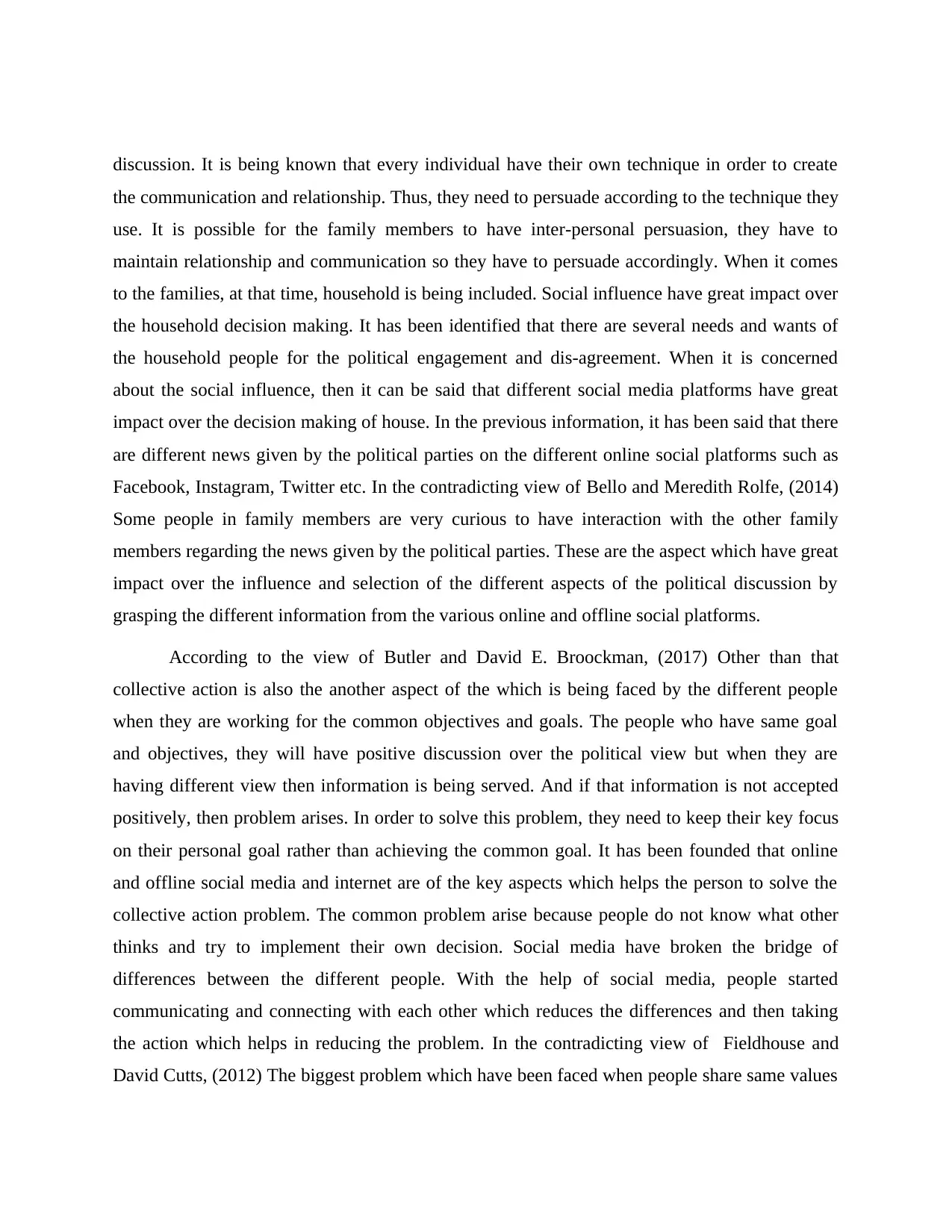
discussion. It is being known that every individual have their own technique in order to create
the communication and relationship. Thus, they need to persuade according to the technique they
use. It is possible for the family members to have inter-personal persuasion, they have to
maintain relationship and communication so they have to persuade accordingly. When it comes
to the families, at that time, household is being included. Social influence have great impact over
the household decision making. It has been identified that there are several needs and wants of
the household people for the political engagement and dis-agreement. When it is concerned
about the social influence, then it can be said that different social media platforms have great
impact over the decision making of house. In the previous information, it has been said that there
are different news given by the political parties on the different online social platforms such as
Facebook, Instagram, Twitter etc. In the contradicting view of Bello and Meredith Rolfe, (2014)
Some people in family members are very curious to have interaction with the other family
members regarding the news given by the political parties. These are the aspect which have great
impact over the influence and selection of the different aspects of the political discussion by
grasping the different information from the various online and offline social platforms.
According to the view of Butler and David E. Broockman, (2017) Other than that
collective action is also the another aspect of the which is being faced by the different people
when they are working for the common objectives and goals. The people who have same goal
and objectives, they will have positive discussion over the political view but when they are
having different view then information is being served. And if that information is not accepted
positively, then problem arises. In order to solve this problem, they need to keep their key focus
on their personal goal rather than achieving the common goal. It has been founded that online
and offline social media and internet are of the key aspects which helps the person to solve the
collective action problem. The common problem arise because people do not know what other
thinks and try to implement their own decision. Social media have broken the bridge of
differences between the different people. With the help of social media, people started
communicating and connecting with each other which reduces the differences and then taking
the action which helps in reducing the problem. In the contradicting view of Fieldhouse and
David Cutts, (2012) The biggest problem which have been faced when people share same values
the communication and relationship. Thus, they need to persuade according to the technique they
use. It is possible for the family members to have inter-personal persuasion, they have to
maintain relationship and communication so they have to persuade accordingly. When it comes
to the families, at that time, household is being included. Social influence have great impact over
the household decision making. It has been identified that there are several needs and wants of
the household people for the political engagement and dis-agreement. When it is concerned
about the social influence, then it can be said that different social media platforms have great
impact over the decision making of house. In the previous information, it has been said that there
are different news given by the political parties on the different online social platforms such as
Facebook, Instagram, Twitter etc. In the contradicting view of Bello and Meredith Rolfe, (2014)
Some people in family members are very curious to have interaction with the other family
members regarding the news given by the political parties. These are the aspect which have great
impact over the influence and selection of the different aspects of the political discussion by
grasping the different information from the various online and offline social platforms.
According to the view of Butler and David E. Broockman, (2017) Other than that
collective action is also the another aspect of the which is being faced by the different people
when they are working for the common objectives and goals. The people who have same goal
and objectives, they will have positive discussion over the political view but when they are
having different view then information is being served. And if that information is not accepted
positively, then problem arises. In order to solve this problem, they need to keep their key focus
on their personal goal rather than achieving the common goal. It has been founded that online
and offline social media and internet are of the key aspects which helps the person to solve the
collective action problem. The common problem arise because people do not know what other
thinks and try to implement their own decision. Social media have broken the bridge of
differences between the different people. With the help of social media, people started
communicating and connecting with each other which reduces the differences and then taking
the action which helps in reducing the problem. In the contradicting view of Fieldhouse and
David Cutts, (2012) The biggest problem which have been faced when people share same values
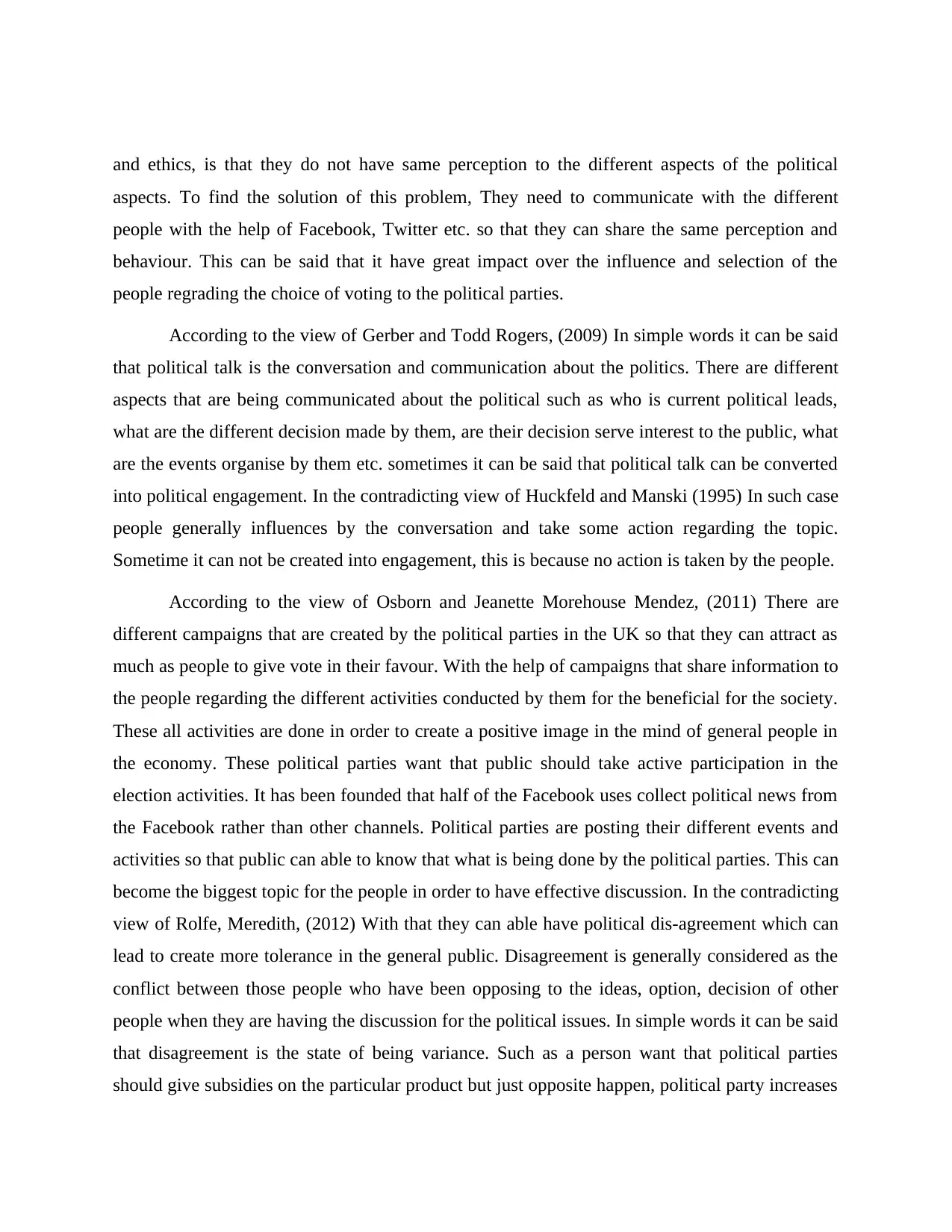
and ethics, is that they do not have same perception to the different aspects of the political
aspects. To find the solution of this problem, They need to communicate with the different
people with the help of Facebook, Twitter etc. so that they can share the same perception and
behaviour. This can be said that it have great impact over the influence and selection of the
people regrading the choice of voting to the political parties.
According to the view of Gerber and Todd Rogers, (2009) In simple words it can be said
that political talk is the conversation and communication about the politics. There are different
aspects that are being communicated about the political such as who is current political leads,
what are the different decision made by them, are their decision serve interest to the public, what
are the events organise by them etc. sometimes it can be said that political talk can be converted
into political engagement. In the contradicting view of Huckfeld and Manski (1995) In such case
people generally influences by the conversation and take some action regarding the topic.
Sometime it can not be created into engagement, this is because no action is taken by the people.
According to the view of Osborn and Jeanette Morehouse Mendez, (2011) There are
different campaigns that are created by the political parties in the UK so that they can attract as
much as people to give vote in their favour. With the help of campaigns that share information to
the people regarding the different activities conducted by them for the beneficial for the society.
These all activities are done in order to create a positive image in the mind of general people in
the economy. These political parties want that public should take active participation in the
election activities. It has been founded that half of the Facebook uses collect political news from
the Facebook rather than other channels. Political parties are posting their different events and
activities so that public can able to know that what is being done by the political parties. This can
become the biggest topic for the people in order to have effective discussion. In the contradicting
view of Rolfe, Meredith, (2012) With that they can able have political dis-agreement which can
lead to create more tolerance in the general public. Disagreement is generally considered as the
conflict between those people who have been opposing to the ideas, option, decision of other
people when they are having the discussion for the political issues. In simple words it can be said
that disagreement is the state of being variance. Such as a person want that political parties
should give subsidies on the particular product but just opposite happen, political party increases
aspects. To find the solution of this problem, They need to communicate with the different
people with the help of Facebook, Twitter etc. so that they can share the same perception and
behaviour. This can be said that it have great impact over the influence and selection of the
people regrading the choice of voting to the political parties.
According to the view of Gerber and Todd Rogers, (2009) In simple words it can be said
that political talk is the conversation and communication about the politics. There are different
aspects that are being communicated about the political such as who is current political leads,
what are the different decision made by them, are their decision serve interest to the public, what
are the events organise by them etc. sometimes it can be said that political talk can be converted
into political engagement. In the contradicting view of Huckfeld and Manski (1995) In such case
people generally influences by the conversation and take some action regarding the topic.
Sometime it can not be created into engagement, this is because no action is taken by the people.
According to the view of Osborn and Jeanette Morehouse Mendez, (2011) There are
different campaigns that are created by the political parties in the UK so that they can attract as
much as people to give vote in their favour. With the help of campaigns that share information to
the people regarding the different activities conducted by them for the beneficial for the society.
These all activities are done in order to create a positive image in the mind of general people in
the economy. These political parties want that public should take active participation in the
election activities. It has been founded that half of the Facebook uses collect political news from
the Facebook rather than other channels. Political parties are posting their different events and
activities so that public can able to know that what is being done by the political parties. This can
become the biggest topic for the people in order to have effective discussion. In the contradicting
view of Rolfe, Meredith, (2012) With that they can able have political dis-agreement which can
lead to create more tolerance in the general public. Disagreement is generally considered as the
conflict between those people who have been opposing to the ideas, option, decision of other
people when they are having the discussion for the political issues. In simple words it can be said
that disagreement is the state of being variance. Such as a person want that political parties
should give subsidies on the particular product but just opposite happen, political party increases
⊘ This is a preview!⊘
Do you want full access?
Subscribe today to unlock all pages.

Trusted by 1+ million students worldwide
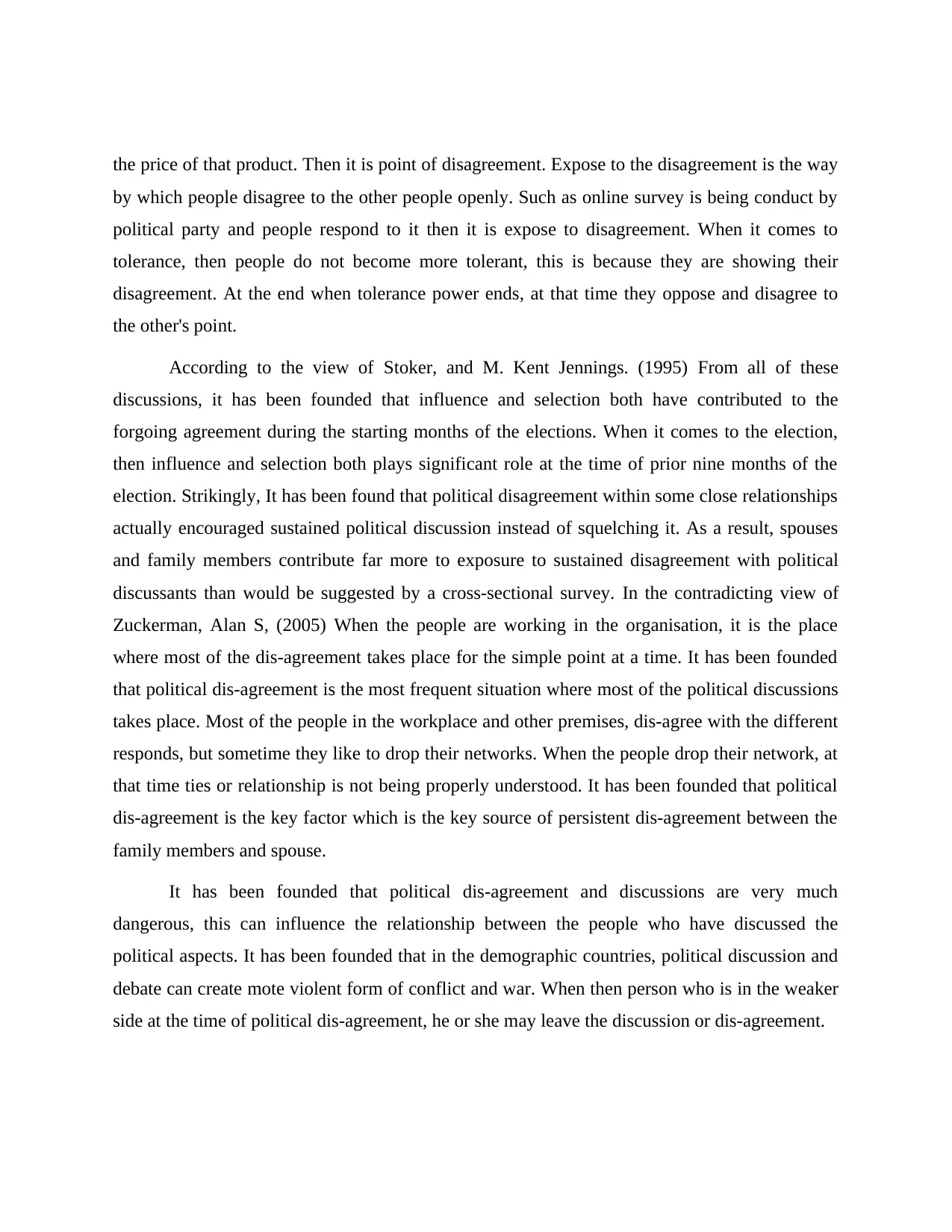
the price of that product. Then it is point of disagreement. Expose to the disagreement is the way
by which people disagree to the other people openly. Such as online survey is being conduct by
political party and people respond to it then it is expose to disagreement. When it comes to
tolerance, then people do not become more tolerant, this is because they are showing their
disagreement. At the end when tolerance power ends, at that time they oppose and disagree to
the other's point.
According to the view of Stoker, and M. Kent Jennings. (1995) From all of these
discussions, it has been founded that influence and selection both have contributed to the
forgoing agreement during the starting months of the elections. When it comes to the election,
then influence and selection both plays significant role at the time of prior nine months of the
election. Strikingly, It has been found that political disagreement within some close relationships
actually encouraged sustained political discussion instead of squelching it. As a result, spouses
and family members contribute far more to exposure to sustained disagreement with political
discussants than would be suggested by a cross-sectional survey. In the contradicting view of
Zuckerman, Alan S, (2005) When the people are working in the organisation, it is the place
where most of the dis-agreement takes place for the simple point at a time. It has been founded
that political dis-agreement is the most frequent situation where most of the political discussions
takes place. Most of the people in the workplace and other premises, dis-agree with the different
responds, but sometime they like to drop their networks. When the people drop their network, at
that time ties or relationship is not being properly understood. It has been founded that political
dis-agreement is the key factor which is the key source of persistent dis-agreement between the
family members and spouse.
It has been founded that political dis-agreement and discussions are very much
dangerous, this can influence the relationship between the people who have discussed the
political aspects. It has been founded that in the demographic countries, political discussion and
debate can create mote violent form of conflict and war. When then person who is in the weaker
side at the time of political dis-agreement, he or she may leave the discussion or dis-agreement.
by which people disagree to the other people openly. Such as online survey is being conduct by
political party and people respond to it then it is expose to disagreement. When it comes to
tolerance, then people do not become more tolerant, this is because they are showing their
disagreement. At the end when tolerance power ends, at that time they oppose and disagree to
the other's point.
According to the view of Stoker, and M. Kent Jennings. (1995) From all of these
discussions, it has been founded that influence and selection both have contributed to the
forgoing agreement during the starting months of the elections. When it comes to the election,
then influence and selection both plays significant role at the time of prior nine months of the
election. Strikingly, It has been found that political disagreement within some close relationships
actually encouraged sustained political discussion instead of squelching it. As a result, spouses
and family members contribute far more to exposure to sustained disagreement with political
discussants than would be suggested by a cross-sectional survey. In the contradicting view of
Zuckerman, Alan S, (2005) When the people are working in the organisation, it is the place
where most of the dis-agreement takes place for the simple point at a time. It has been founded
that political dis-agreement is the most frequent situation where most of the political discussions
takes place. Most of the people in the workplace and other premises, dis-agree with the different
responds, but sometime they like to drop their networks. When the people drop their network, at
that time ties or relationship is not being properly understood. It has been founded that political
dis-agreement is the key factor which is the key source of persistent dis-agreement between the
family members and spouse.
It has been founded that political dis-agreement and discussions are very much
dangerous, this can influence the relationship between the people who have discussed the
political aspects. It has been founded that in the demographic countries, political discussion and
debate can create mote violent form of conflict and war. When then person who is in the weaker
side at the time of political dis-agreement, he or she may leave the discussion or dis-agreement.
Paraphrase This Document
Need a fresh take? Get an instant paraphrase of this document with our AI Paraphraser
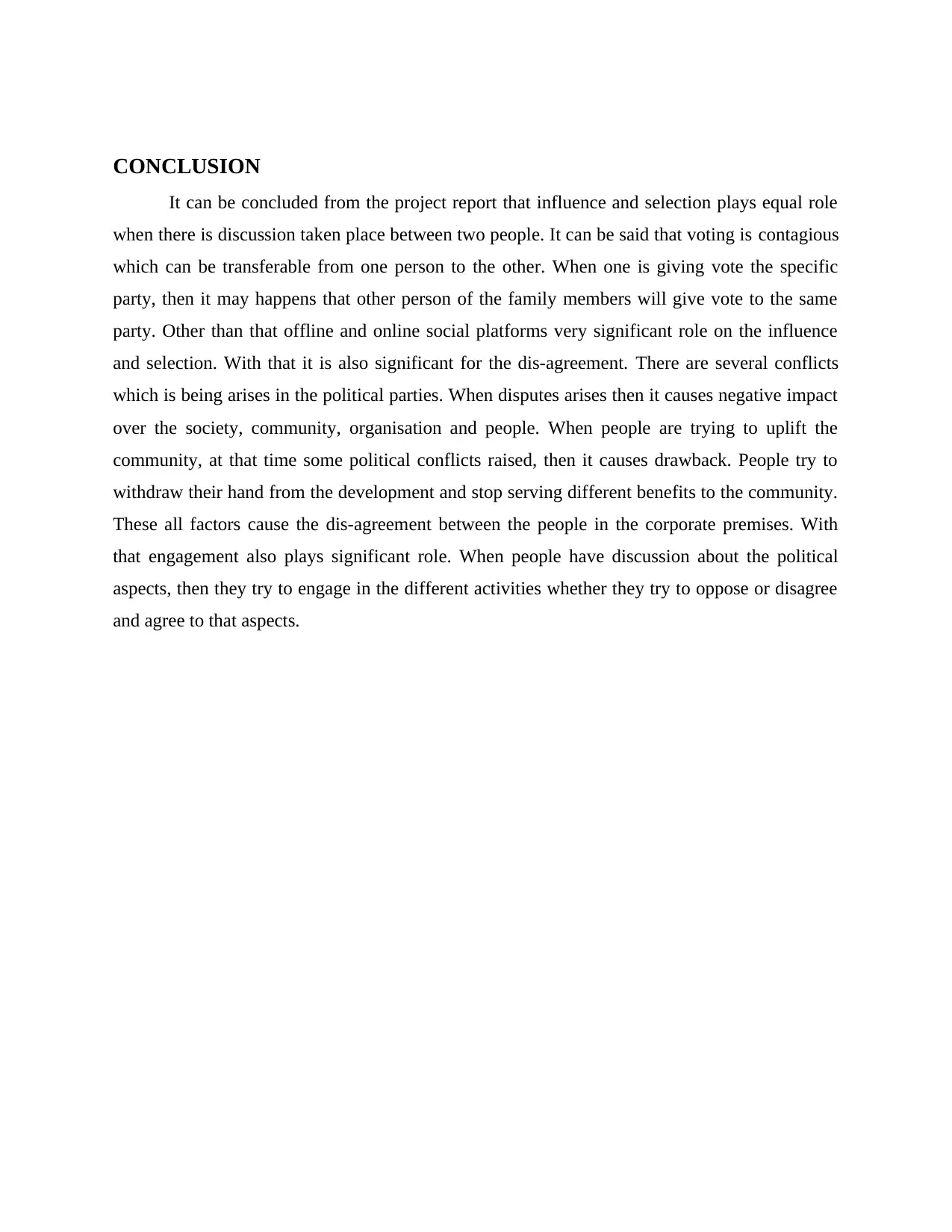
CONCLUSION
It can be concluded from the project report that influence and selection plays equal role
when there is discussion taken place between two people. It can be said that voting is contagious
which can be transferable from one person to the other. When one is giving vote the specific
party, then it may happens that other person of the family members will give vote to the same
party. Other than that offline and online social platforms very significant role on the influence
and selection. With that it is also significant for the dis-agreement. There are several conflicts
which is being arises in the political parties. When disputes arises then it causes negative impact
over the society, community, organisation and people. When people are trying to uplift the
community, at that time some political conflicts raised, then it causes drawback. People try to
withdraw their hand from the development and stop serving different benefits to the community.
These all factors cause the dis-agreement between the people in the corporate premises. With
that engagement also plays significant role. When people have discussion about the political
aspects, then they try to engage in the different activities whether they try to oppose or disagree
and agree to that aspects.
It can be concluded from the project report that influence and selection plays equal role
when there is discussion taken place between two people. It can be said that voting is contagious
which can be transferable from one person to the other. When one is giving vote the specific
party, then it may happens that other person of the family members will give vote to the same
party. Other than that offline and online social platforms very significant role on the influence
and selection. With that it is also significant for the dis-agreement. There are several conflicts
which is being arises in the political parties. When disputes arises then it causes negative impact
over the society, community, organisation and people. When people are trying to uplift the
community, at that time some political conflicts raised, then it causes drawback. People try to
withdraw their hand from the development and stop serving different benefits to the community.
These all factors cause the dis-agreement between the people in the corporate premises. With
that engagement also plays significant role. When people have discussion about the political
aspects, then they try to engage in the different activities whether they try to oppose or disagree
and agree to that aspects.
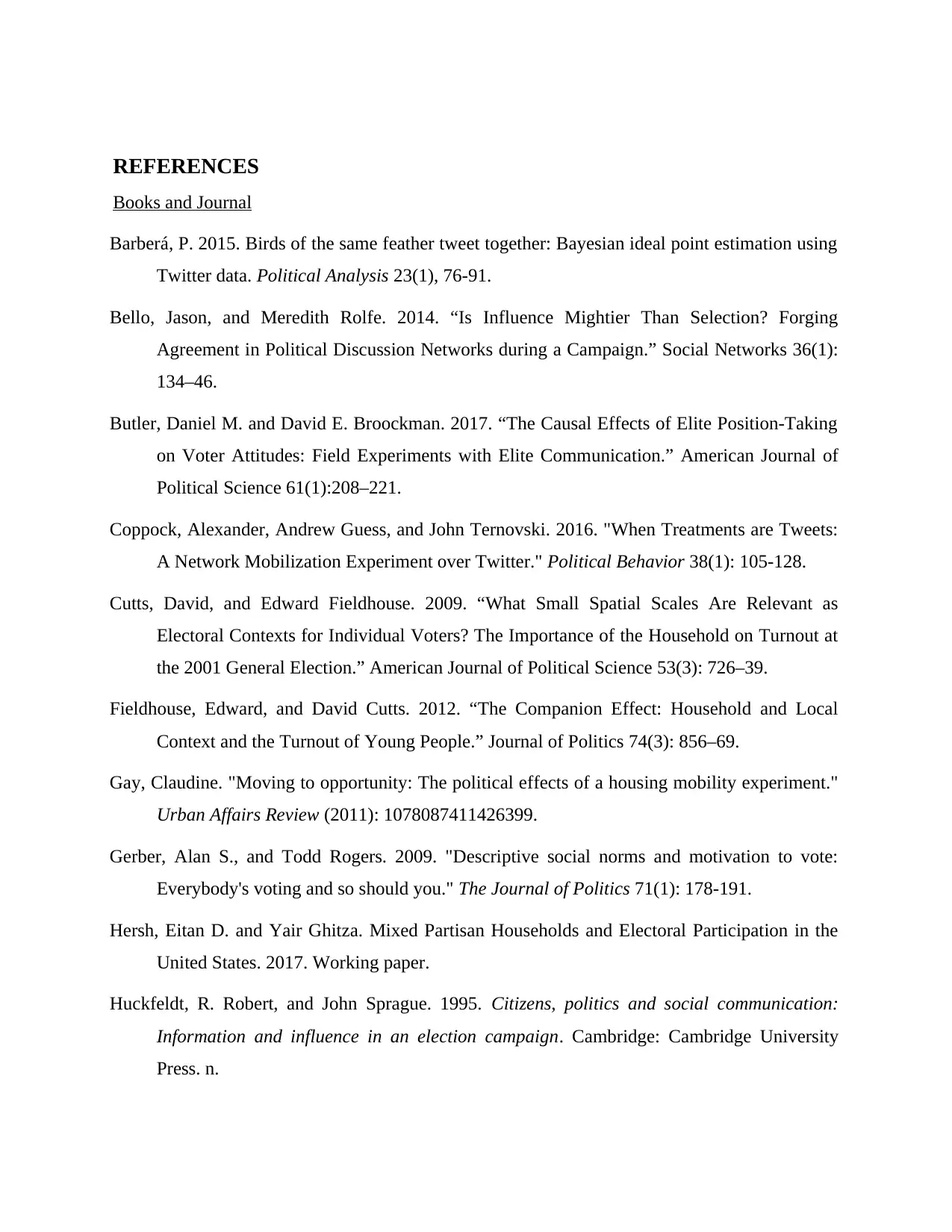
REFERENCES
Books and Journal
Barberá, P. 2015. Birds of the same feather tweet together: Bayesian ideal point estimation using
Twitter data. Political Analysis 23(1), 76-91.
Bello, Jason, and Meredith Rolfe. 2014. “Is Influence Mightier Than Selection? Forging
Agreement in Political Discussion Networks during a Campaign.” Social Networks 36(1):
134–46.
Butler, Daniel M. and David E. Broockman. 2017. “The Causal Effects of Elite Position-Taking
on Voter Attitudes: Field Experiments with Elite Communication.” American Journal of
Political Science 61(1):208–221.
Coppock, Alexander, Andrew Guess, and John Ternovski. 2016. "When Treatments are Tweets:
A Network Mobilization Experiment over Twitter." Political Behavior 38(1): 105-128.
Cutts, David, and Edward Fieldhouse. 2009. “What Small Spatial Scales Are Relevant as
Electoral Contexts for Individual Voters? The Importance of the Household on Turnout at
the 2001 General Election.” American Journal of Political Science 53(3): 726–39.
Fieldhouse, Edward, and David Cutts. 2012. “The Companion Effect: Household and Local
Context and the Turnout of Young People.” Journal of Politics 74(3): 856–69.
Gay, Claudine. "Moving to opportunity: The political effects of a housing mobility experiment."
Urban Affairs Review (2011): 1078087411426399.
Gerber, Alan S., and Todd Rogers. 2009. "Descriptive social norms and motivation to vote:
Everybody's voting and so should you." The Journal of Politics 71(1): 178-191.
Hersh, Eitan D. and Yair Ghitza. Mixed Partisan Households and Electoral Participation in the
United States. 2017. Working paper.
Huckfeldt, R. Robert, and John Sprague. 1995. Citizens, politics and social communication:
Information and influence in an election campaign. Cambridge: Cambridge University
Press. n.
Books and Journal
Barberá, P. 2015. Birds of the same feather tweet together: Bayesian ideal point estimation using
Twitter data. Political Analysis 23(1), 76-91.
Bello, Jason, and Meredith Rolfe. 2014. “Is Influence Mightier Than Selection? Forging
Agreement in Political Discussion Networks during a Campaign.” Social Networks 36(1):
134–46.
Butler, Daniel M. and David E. Broockman. 2017. “The Causal Effects of Elite Position-Taking
on Voter Attitudes: Field Experiments with Elite Communication.” American Journal of
Political Science 61(1):208–221.
Coppock, Alexander, Andrew Guess, and John Ternovski. 2016. "When Treatments are Tweets:
A Network Mobilization Experiment over Twitter." Political Behavior 38(1): 105-128.
Cutts, David, and Edward Fieldhouse. 2009. “What Small Spatial Scales Are Relevant as
Electoral Contexts for Individual Voters? The Importance of the Household on Turnout at
the 2001 General Election.” American Journal of Political Science 53(3): 726–39.
Fieldhouse, Edward, and David Cutts. 2012. “The Companion Effect: Household and Local
Context and the Turnout of Young People.” Journal of Politics 74(3): 856–69.
Gay, Claudine. "Moving to opportunity: The political effects of a housing mobility experiment."
Urban Affairs Review (2011): 1078087411426399.
Gerber, Alan S., and Todd Rogers. 2009. "Descriptive social norms and motivation to vote:
Everybody's voting and so should you." The Journal of Politics 71(1): 178-191.
Hersh, Eitan D. and Yair Ghitza. Mixed Partisan Households and Electoral Participation in the
United States. 2017. Working paper.
Huckfeldt, R. Robert, and John Sprague. 1995. Citizens, politics and social communication:
Information and influence in an election campaign. Cambridge: Cambridge University
Press. n.
⊘ This is a preview!⊘
Do you want full access?
Subscribe today to unlock all pages.

Trusted by 1+ million students worldwide
1 out of 13
Related Documents
Your All-in-One AI-Powered Toolkit for Academic Success.
+13062052269
info@desklib.com
Available 24*7 on WhatsApp / Email
![[object Object]](/_next/static/media/star-bottom.7253800d.svg)
Unlock your academic potential
Copyright © 2020–2026 A2Z Services. All Rights Reserved. Developed and managed by ZUCOL.




